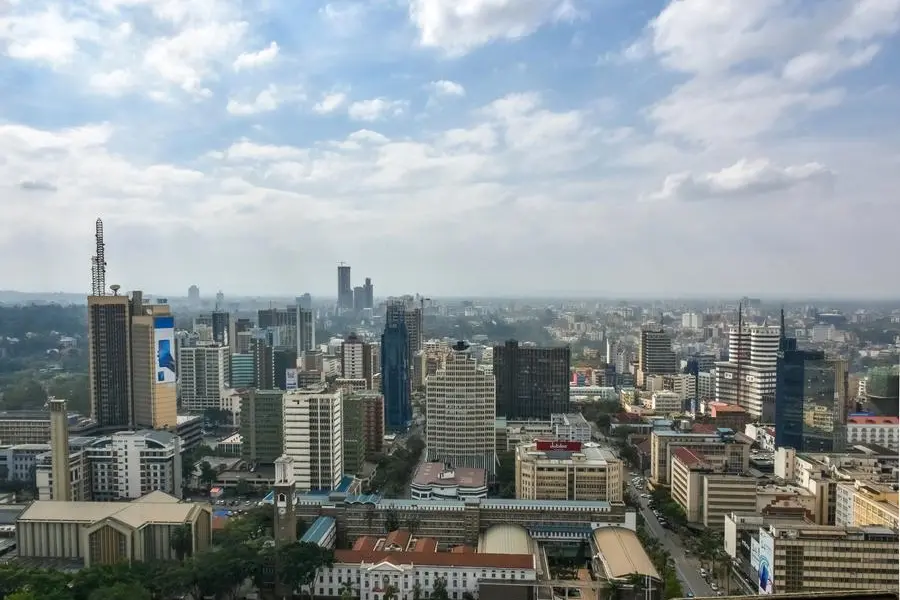PHOTO
The US is listing projects in Kenya and Angola to set an example of what Washington plans to do to increase infrastructure building in Africa, in a series of proposals meant to implement the US-Africa Summit decisions last year.
This week, US officials explained how the Millennium Challenge Corporation (MCC) urban mobility project in Kenya, and the refurbishment of the Lobito Port Corridor in Angola signal Washington’s plan to reconnect more African countries and boost trade, and political stability.
Judd Devermont, the National Security Council Senior Director for African Affairs; British Robinson, Prosper Africa Coordinator; and Jonathan Pratt, the Principal Deputy Assistant Secretary in the Bureau of African Affairs say President Joe Biden’s focus on Africa this year has led to a “record-breaking year”.
Read: Biden’s plan to stem China influence in AfricaIn that time, 17 senior government officials including Vice-President Kamala Harris toured the continent as part of efforts seeking to implement the $55 billion commitment to Africa made after the Summit last December.
In September, Kenya and the MCC signed a $60 million grant agreement to help improve urban transport in Nairobi. It will focus on four main areas such as expanding transportation networks within the larger metropolitan area, building spaces for non-motorised transport, planning for future transport systems and financing options such as rapid bus transit systems as well as regreening the city. The project is only the second in Kenya for the MCC since 2003.
In Angola, the US with the Africa Development Bank, African Finance Corporation and European lenders want to refurbish and expand the Lobito Port Corridor, a railway line connecting Angola’s main port to the Democratic Republic of Congo’s mines and Zambia’s copper belts. It could cost $1.5 billion including solar investments and digital access systems, under the $60 billion Partnership on the Global Infrastructure Investment (PGII).“It’s consistent with the US-Africa strategy’s focus on a pivot towards urban hubs – It’s the largest MCC threshold programme ever, with $16 million for transportation and land-use planning in Nairobi. The continent is going to be 50 percent urban by the end of this decade, and so we are elevating our work on cities and urban environments,” Devermont said on Wednesday about the Nairobi project.
The US has been playing a chasing game on China whose infrastructure investments in Africa have topped $155 billion in the past 20 years. After the Summit last year, Washington says in a Fact Sheet released Wednesday that the US Trade and Development Agency “funded fifteen project preparation grants designed to help leverage more than $3.4 billion in infrastructure finance for projects across the continent.”Read: The new scramble for AfricaVoice elevationBiden is ending yet another year without setting foot in Africa since he became President. But his officials say the US has been influential in having Africa’s voice elevated including admitting the African Union to the G20 and wants an extra seat allocated Sub-Sahara Africa at the IMF Executive Board as well as permanent representation at the UN Security Council.
The US, however, says it will be stuck to the old values of democracy and transparency, seeking to put money only where governance is by the rule of law and where officials are open to regular checks. It will also only put money where there is security, which may explain why Washington has been pushing for a permanent ceasefire in eastern DR Congo, a country roped in on the Lobito Port Corridor.“On security and peace-building, we have engaged in those processes in Ethiopia, Sudan or Niger. Wehave done it with African partners and institutions, and supported their efforts, working hand-in-hand with them, or taking their lead and supporting their efforts,” Pratt said.“So obviously, the African Union, the regional bodies known as Igad for East Africa and Ecowas for West Africa. Everything that we have done has supported their own regional diplomacy. So it’s been nested within a fairly obvious and clearly defined holistic strategy.”That holistic strategy has involved a carrot and stick. In Niger, for instance, where the military toppled an elected President in July, the US supported sanctions imposed by regional bloc Ecowas and cut some direct funding due to Nigerien government.
However, Pratt suggested Niger could be returned to a list of beneficiaries if the junta accepts a return to a civilian government.
Read: Niger coup leaders agree to transition terms“If the country and the leadership there turns back to a democratic path, we’re willing to explore progressively lifting that freeze in assistance and potential investments. Combining sanctions plus leveraging our engagement and assistance,” he said.
Last week, US Director of National Intelligence Avril Haines toured Kinshasa and Kigali to push for a ceasefire, to which both sides agreed to a 72-hour pause in eastern DRC. The two are not directly involved in combat but the US says they have fanned rebel movements targeting each other’s governments.
Washington intends to support digital transformation in Africa as well as programmes to support political transitions, food security and health as well as setting up a ‘connecting’ desk for small traders and suppliers in Africa to be linked with over 12,000 partners in the US.“We have had a record-setting year. As we wind down 2023, we have already delivered on more than 40 percent of this commitment. In fact, by the end of year two, we anticipate surpassing 70 percent of our goal, if not more,” he told a virtual press briefing from Washington, referring to the $55 billion the Biden promised to be invested over the course of three years since the Summit. © Copyright 2022 Nation Media Group. All Rights Reserved. Provided by SyndiGate Media Inc. (Syndigate.info).





















